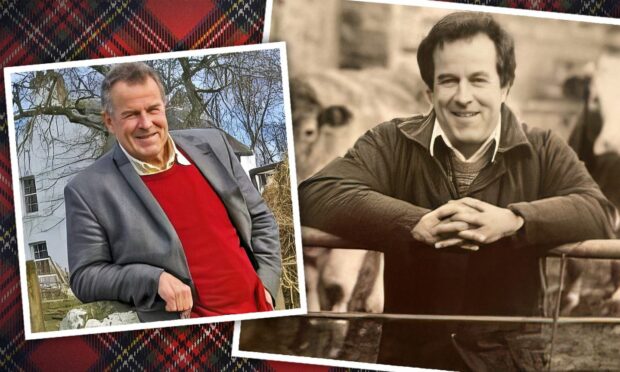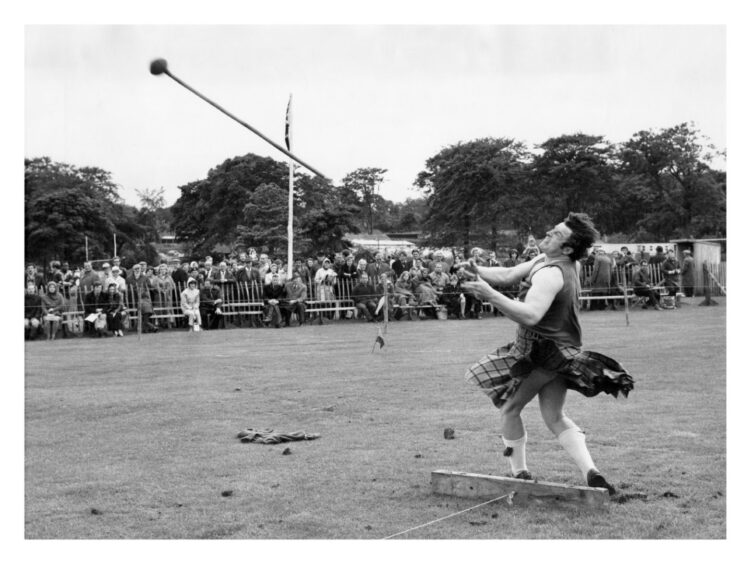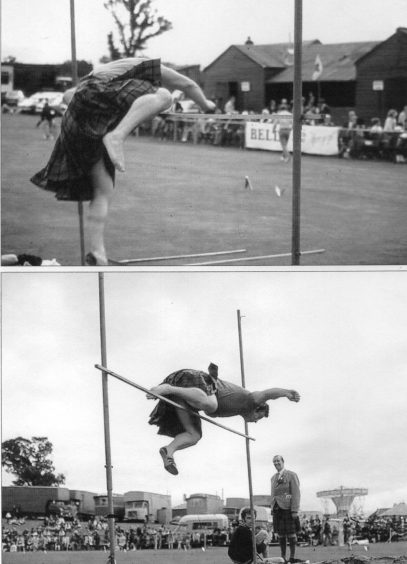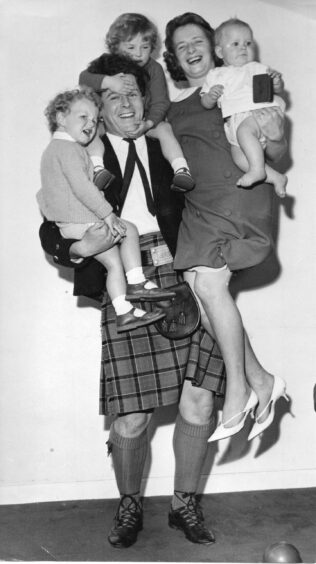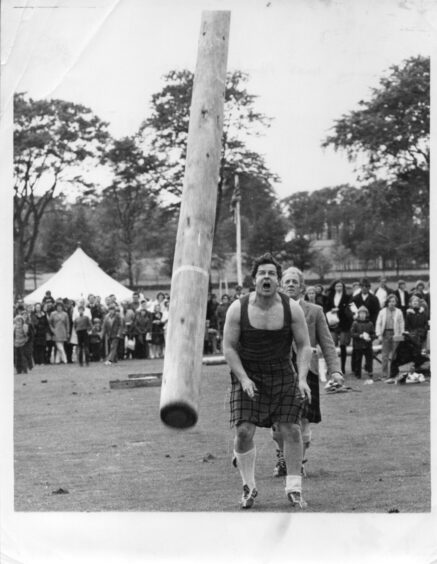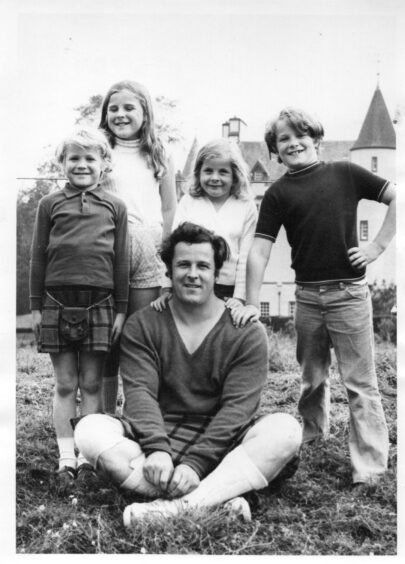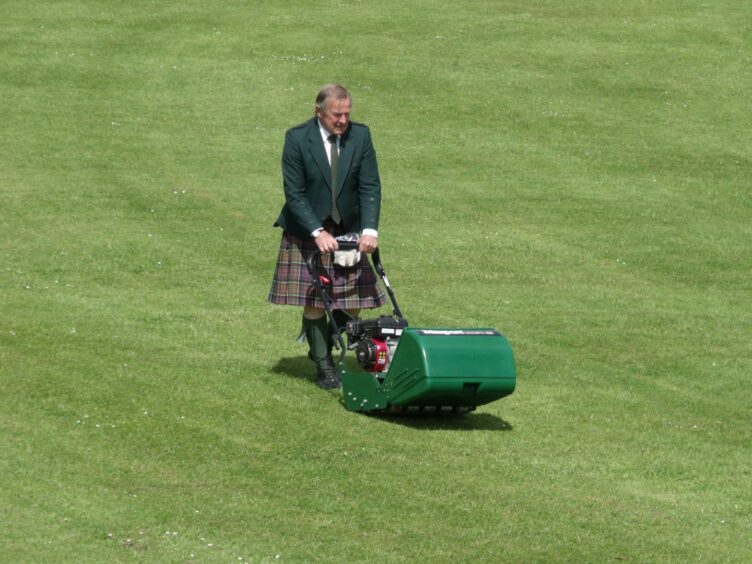World caber-tossing champ, economics lecturer, renowned farmer, radio presenter and writer, Charlie Allan of Methlick has died.
The champion of Doric and popular bothy ballad singer was 84.
Barns to boarding school
Born in Stirling on August 19 1939, the son of Jean Mackie, an educationalist and poet, and John R Allan the writer, he was from well-known farming stock.
As a tot he lived with grandparents near Tarves when his parents “were busy with the war”. He later returned to them at their home on Little Ardo Farm, Methlick.
He began his education at his mother’s pioneering establishment, St Nicholas School in Aberdeen, but was later sent to the progressive boarding school, Dartington Hall, in Devon.
Aberdeen bound
Following secondary education, Charlie returned to the north-east to study economics at Aberdeen University. There, through the athletics club he met St Andrews graduate Fiona Vine, who worked in the university laboratories.
She was a sprinter and Charlie an all-round sportsman.
At 6ft tall weighing 18 stone “with very little fat”, he was a tough man to take on when it came to throwing events.
Charlie married Fiona, who hailed from Dundee, in 1961. Later that year daughter Sarah was born, then son John came along in 1963.
Living in a cottage while Charlie completed university, though his parents felt the timing of his nuptials could be detrimental to his education, he in fact left with a first class honours degree.
Kilts and cabers
His first job was at Glasgow University, then as economics lecturer at St Andrews University (Dundee campus) which meant a move to Tayside where second son Jay was born.
By the mid 1960s Charlie had gained a formidable reputation on the highland games circuit. Competing in all the heavyweight events, he tossed the caber, threw the weight over the bar, did shot put, heavy hammer and light hammer.
“He also loved the high jump… though unlike other competitors dad always kept his kilt on to make the crowd laugh,” said youngest daughter Susie.
Jim Brown, the former chairman of the Highland Games Society, said: “I first knew him through the games and he was so different from the normal heavy athlete – funny, innovative, tricky but extremely able.”
He added that perhaps Charlie’s greatest attributes were that, despite his immense talent and achievements, he was “humble and readily laughed at himself”.
Ever the sportsman
In 1966, on becoming lecturer at Strathclyde University, Charlie and family moved to Giffnock where daughter Susie was born.
Always “keeping himself strong” in 1972 he won the world caber-tossing championship held in Aberdeen.
“Dad was known for many things, but at heart he was a sportsman,” added Susie.
Indeed, Charlie could have gone in so many sporting directions. He was good at football, earning a month’s trial for Aberdeen FC and a contract in the Highland League. Though he chose university instead, it was there he found rugby. His strength and speed made him a brilliant player, yet another sport trumped even rugby.
“From his time in Devon as a child dad loved cricket. In later life this would be somewhat of an obsession,” said Susie.
Little Ardo
Towards the end of the 1970s Charlie and family moved home to Methlick to take over the family farm, Little Ardo.
Without a traditional lead into farming he remained undaunted by the challenge. One of the first to import Simmental cattle, Charlie’s competitive edge came to the fore again, showing the breed to great success.
In his 40s he took up marathon running. “Not built for it” he raced only against himself, setting personal targets to beat. He took part in the Aberdeen Marathon twice before happening upon cycling. Resulting in somewhat of an obsession, at 60 he cycled 100 miles in under five hours and raised thousands in the process, for a Kenyan primary school.
A “kept man”
While Charlie grew the farm, Fiona worked as a maths teacher at Turriff Academy before studying to become a software analyst.
Charlie was offered a job with BBC Radio Aberdeen presenting a farming programme, airing across Scotland in the 1980s. A popular host, he continued this until 1985 when Fiona got a British Council job maintaining software for the Kenyan education authorities.
“Until then mum had gone with dad wherever his career took him, but this time he left his job to go with her,” said Susie.
Charlie sold the herd and became the first man to receive a spousal visa in order to live in Kenya. It was unfathomable in Kenya, until then, that a woman could be the main earner.
An unexpected pleasure, he loved his time in Africa. He picked up work for the BBC World Service and wrote a column for The Press and Journal, and The Herald.
Indulging his love of sport he joined the Nairobi cricket club, watching and occasionally playing for the team.
Lasting legacy
On returning to Methlick Fiona and Charlie built a house on the grounds of the farm, then run by daughter Sarah.
He penned two autobiographical novels: The Truth Tells Twice and Them That Live the Longest, and a collection of his humorous Farmer’s Diary columns were also turned into a book.
Ever the sportsman, one of his lasting legacies will be the creation of Methlick Cricket Club. Offered a “friendly rent” by Lord Aberdeen, Charlie and others raised funds to create cricket ground “Laird’s”, and see the village compete with vigour and heart in the village cricket leagues.
Family tribute
A bothy ballad singer and champion of Doric, Charlie had a serious spinal stroke at 72.
The family were told to prepare themselves for the worst but in true Charlie style the competitor in him pushed through, learning to walk and even cycle again, albeit indoors.
In their later years he and Fiona moved to a cottage in Methlick but when his health deteriorated further Charlie relocated to a nursing home.
Granddad of 10, and of four great-grandchildren “so far”, he passed away on December 13.
His funeral will take place in Methlick Church on December 29 where his family will sing one of his most famous songs, Lonely in the Bothy.
“Dad never believed much of anything the Bible taught him – but if there is another realm, its inhabitants will not want for entertainment – that’s for sure!” added Charlie’s son John.
